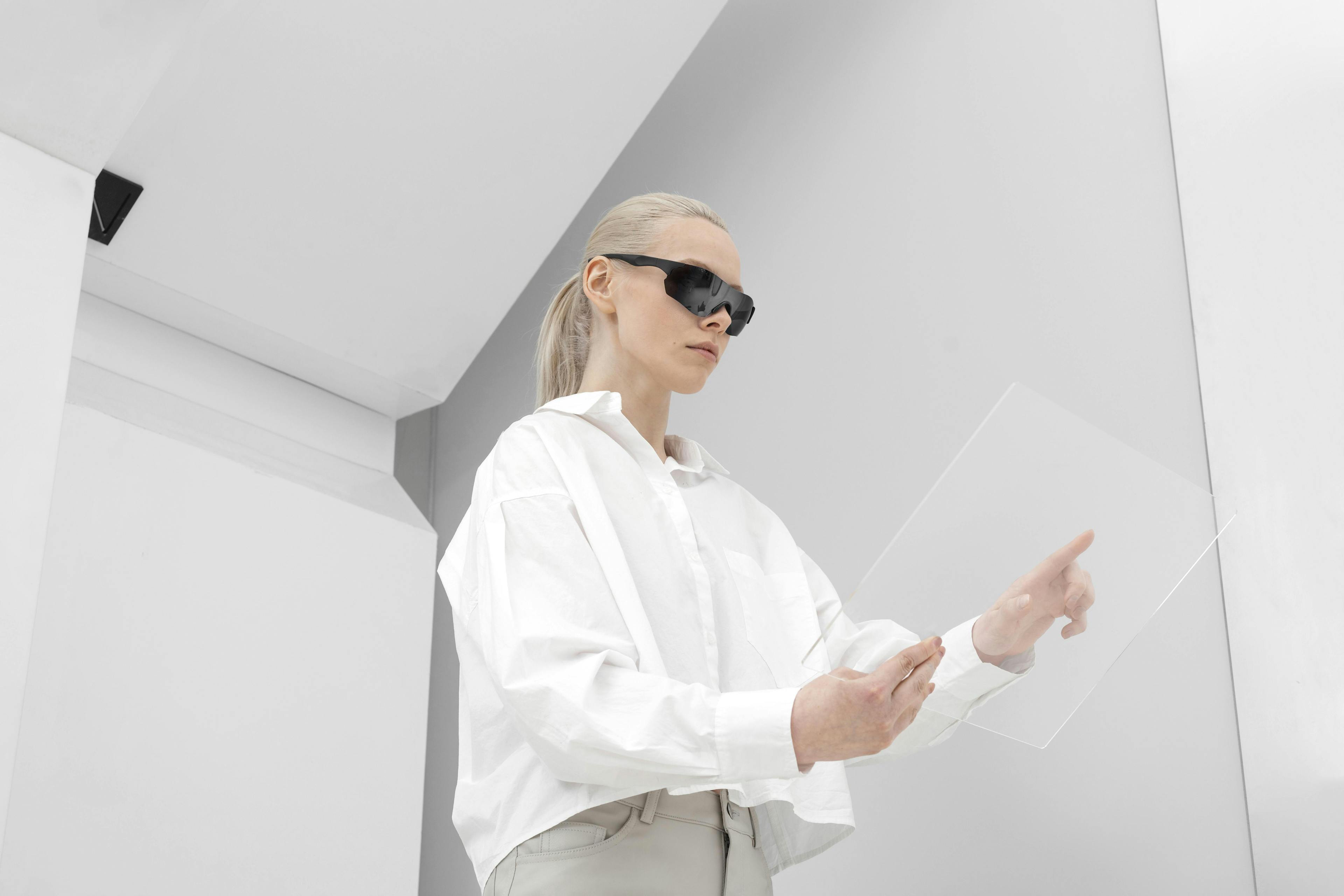
NRF 2023 - 12 innovations to make fashion e-commerce more engaging
Virtual try-on, augmented reality, holograms...discover our selection of startups that are revolutionizing fashion e-commerce during the Retail's Big Show, the New York trade show organized every year by the NRF (National Retail Federation).
I) In-store innovations to attract customers
1) Hologram: an experience that makes e-commerce immersive
ARHT Media has set up a solution to create interactive holograms in a few seconds thanks to an internet connection and a connected screen. The device includes a camera and a microphone, which facilitates the exchange (especially for events, remote training ...).
These holograms also allow fashion brands to expose their products to customers. Indeed, with the touch screen at their disposal, customers can have a 360 degrees view of the products, and place directly order thanks to a QR code.
The solution is already deployed in Italy and in the United States, and is helping to reinvent customer engagement, and to make online shopping more interactive and efficient.
2) Shoe sizing in store: Volumental
Volumental has created a technology that allows customers to find shoes that fit perfectly thanks to artificial intelligence and shopping data (30 million 3D foot scans taken by their customers such as New Balance, Under Armour, Fleet feet... ). Once the feet are scanned, the technology defines the exact size and makes appropriate shoe recommendations to the customer.
Volumental aims to modernize the shoe shopping experience, increase conversion and decrease returns for brands.
3) Circular fashion: clothing rental & second hand
Lizee responds to one of the major issues of the moment: circular fashion. The start-up has launched clothing rental and second-hand projects.
With its SaaS solution, brands and retailers can manage their stores, online sales, shipping, returns management and refurbishment directly from the platform.
Their goal is to make retail more sustainable and cut global new product production in half by helping brands maximize item reuse.
4) Clienteling: the retail concept to build consumer loyalty
Alpha is a platform that simplifies and enriches the relationship between brands and customers. With their solution, Alpha helps brands offer their customers a red carpet-like shopping experience: a tailored communication channel filled with product inspiration, customer requests, styling sessions, and one-click purchase and trial opportunities.
The goal is to redefine the use of digital tools in luxury, and offer a shopping service to keep brands and customers engaged.
II) E-commerce innovations to engage customers and boost sales
5) Eco-design: a new way to simplify the customer experience
TwicPics is a solution that automates the processing and optimization of web images/videos (sizing and compression) in real time. No need for e-tailers to worry about media formats and browser compatibility. Every user sees pixel-perfect images or videos, adapted to their browser and device.
This solution helps to provide a better visual experience for users with high quality images, boost website engagement with faster page load times, while reducing the carbon footprint.
6) Online fitting accessories to boost e-commerce
Tangiblee is helping to revolutionize the online shopping experience for retailers through virtual reality. The startup offers immersive and interactive shopping of accessories through mobile. Customers can scan their wrists to try on a watch or their hands to try on rings, and see the rendering directly on them.
Tangiblee also offers other solutions such as the visualization of furniture in a virtual room, the visualization of several products side by side to compare the size, style ... or the visualization of items that will fit in a handbag.
7) Curated for you : une nouvelle façon de faire de la recommandation de produits
Curated For You is a product discovery platform based on the lifestyle of customers. The platform aims to help retailers to show different products to consumers according to the events that drive them to buy. The startup wants to push e-retailers to no longer show their products according to "basic" catalogs but according to the natural behavior of customers. For example, for an occasion "graduation dress", for an event "Coachella outfit", according to the trends "coastal grandmother"...
The CFY platform improves website search, SEO, customer acquisition and time optimization for retailers.
8) Maximize your profits by automating product recommendations
FindMine automates and adapts content creation so that 95% of products give look recommendations. Customers love to be guided, and spend according to FindMine 3x more when they receive advice or recommendations. The startup offers to automatically generate look recommendations, saving 99% of the time of internal teams, while preserving the vision and brand image along the way.
9) Dressipi limits product misattribution and provides customer-centric recommendations
Just like CFY, Dressipi offers personalized product and outfit recommendations based on seasonality, trends, morphology, tastes...
The objective is to show each visitor items that he is likely to buy and keep. The products are automatically labeled with three times more details, to cope with misallocations and missing values.
According to Dressipi, their solution has increased customer profits by 21% and decreased returns by 15%.
10) Like A Glove: a new experience for size recommendation
Like A Glove comes to answer a major challenge of online clothes shopping: the size.
The startup offers "smart" shorts that measure the shape of customers and the flexibility of fabrics in 3D, with great precision. Thanks to this precision, Like a glove recommends the best fitting jeans to consumers. This solution, which works with a scanner that attaches directly to the smartphone, takes virtual fitting to a new level. The goal of the startup is to push customers to make their purchases according to their personal shapes and not according to standard sizes.
11) Syte : a solution for visual search
Syte is a "visual search" platform, which uses artificial intelligence to deliver intuitive search and product discovery experiences that drive conversion. The startup offers visual search, automatic product tagging, personalized recommendations...
12) Content personalization for customer acquisition and retention
Offerfit makes it easy for brands to personalize their content. Thanks to their test and learn system, the startup helps brands boost their KPI's, by automatically proposing the right channel, the right message, the right illustration, and the right moment for each customer.
RESOURCES
Discover our new article

"Complete the Look" Banners : is it enough ?
Scroll through any product page on a fashion eCommerce site and chances are you’ll see it: a “Wear it With” or “How to Style It” section, usually nestled just beneath the product. These are variations of what many fashion brands refer to as “Complete the Look” banners—a quick way to suggest complementary items that finish an outfit.

Has Online Shopping Lost Its Spark?
For years, e-commerce has delivered on convenience, speed, and scale. But something essential may have been lost along the way: the joy of shopping.

5 Ways Virtual Fitting Can Elevate Your Fashion Brand’s Online Presence
Virtual fitting has become a must-have in fashion e-commerce. Just like everything in fashion, ignoring the trend means falling behind. Virtual Fitting is more than a nice-to-have, it boosts your online shopping experience while making it more accessible and engaging for everyone.
